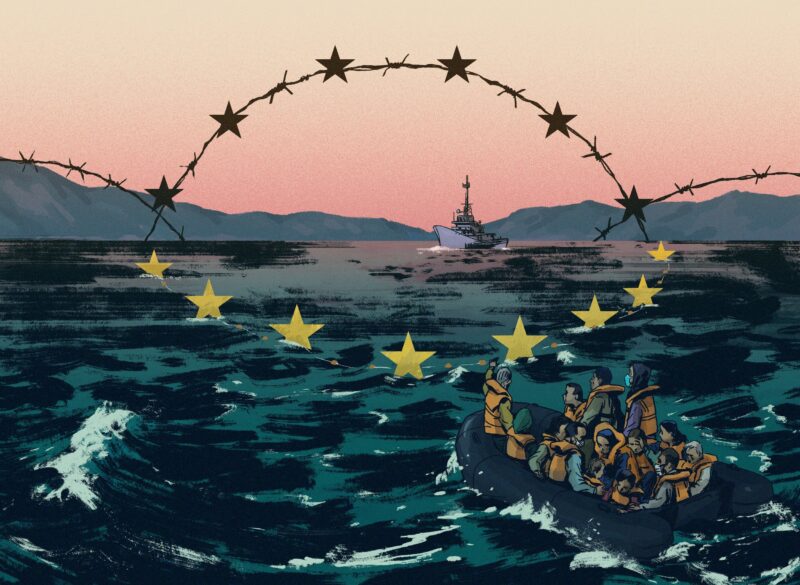
Shipwreck in Pylos: Greece’s responsibilities against the background of the European Ombudsman’s report and the country’s international obligations



On 28 February 2024, the European Ombudsman, Emily O’Reilly, published her report with her conclusions on the Pylos shipwreck and the framework in which search and rescue operations are carried out between the European Border and Coast Guard Agency (Frontex) and the authorities of EU Member States, in this case the Greek Coast Guard.
The report notes that there are growing concerns about systematic violations of fundamental rights in Greece’s border control operations, to the extent that Frontex should reassess its cooperation with the Greek authorities.
Had it done so, it may have been in a position to record what happened and possibly influenced the actions of the HCG.”
Whilst the Greek Naval Court is currently investigating the Coast Guard’s actions, a senior Commission official has highlighted difficulties in communicating with the Naval Court regarding updates on the progress of the Court’s investigation.
The report concludes that, “it is regrettable that, at EU level, there is no single accountability mechanism that could independently investigate all related issues, including the role of the Greek authorities, the role of Frontex, and the role of any other relevant institution, such as the European Commission, which has responsibility for ensuring compliance with fundamental rights provisions under the EU Treaties.”
The Ombudsman also highlights that, less than a year before the tragedy, the European Court of Human Rights had ruled against Greece in a similar case where the Greek authorities’ actions had allegedly caused a fishing boat carrying migrants to capsize in 2014, resulting in the deaths of 11 people, a claim denied by Greece. The Adriana tragedy therefore took place when Frontex was fully aware of the recent history of concerns about the Greek authorities’ compliance with fundamental rights obligations. Even so, the current rules prevented Frontex from taking a more active role in the Adriana incident.
This raises questions around the Greek authorities’ compliance with the national, EU and international framework for the protection of the right to asylum as a fundamental right of refugees in the territory of EU Member States.
According to the European Commission, “The European Union is an area of protection for people fleeing persecution or serious harm in their country of origin.Asylum is a fundamental right and an international obligation for countries, as recognised in the 1951 Geneva Convention on the protection of refugees.”
The core principle of the 1951 Convention relating to the Status of Refugees is non-refoulement, which asserts that a refugee should not be returned to a country where they face serious threats to their life or freedom. The document also outlines the basic minimum standards for the treatment of refugees, including the right to housing, work and education while displaced so they can lead a dignified and independent life. It also defines a refugee’s obligations to host countries and specifies certain categories of people, such as war criminals, who do not qualify for refugee status.
The Greek Authorities also have specific search and rescue obligations under international and national law, as provided for by international conventions, on the one hand for communication and coordination measures to be adopted in cases of danger to life in the maritime area under their jurisdiction, and on the other hand for rescue measures for those in danger in their coastal areas. In particular, as noted in the Guide of the International Maritime Organisation (IMO), the UNHCR and the International Chamber of Shipping, the following conventions impose specific obligations on Greece for the search and rescue of persons in distress, including refugees and migrants:
Further investigation is required to determine whether the above rules were applied in an appropriate manner in the Adriana’s case.
Under the rule of law, the authorities must apply the international legal framework for the search and rescue of persons in distress at sea, as well as for the international protection of refugees from war, illiberal and anti-democratic regimes and other dangers in their countries of origin, by refraining from the illegal refoulement of asylum seekers.
As the UNHCR has noted, European law requires that border surveillance measures must be implemented in full compliance with human rights and refugee law, including the 1951 Convention, while states must honour their commitments and respect fundamental human rights, such as the right to life and the right to asylum.
However, the European Ombudsman’s report on the Pylos shipwreck raises serious questions as to whether the Greek authorities applied the international, EU and national framework of obligations for the rescue and international protection of the people on board the Adriana.
Bank Account number: 1100 0232 0016 560
IBAN: GR56 0140 1100 1100 0232 0016 560
BIC: CRBAGRAA
![]()
In a time where the very foundations of democracy are gradually being eroded by the rise of extreme nationalism, alt-right movements, the spread of disinformation and corporate capture, the efforts of organisations such as Vouliwatch are more relevant than ever.
We rely on the generosity of each and every one of you to continue with our efforts for more transparency and accounta
By financially supporting Vouliwatch you support our litigation strategy, our campaigns for transparency and accountability in the political system, the development of new civic tech tools, our research projects and last but not least our impartial and accurate